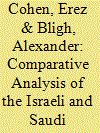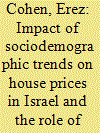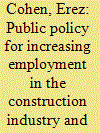|
|
|
Sort Order |
|
|
|
Items / Page
|
|
|
|
|
|
|
| Srl | Item |
| 1 |
ID:
191933


|
|
|
|
|
| Summary/Abstract |
After many years in which Egypt (1979) and Jordan (1994) were the only Arab countries to have peace treaties with Israel, in 2020 the United Arab Emirates (UAE), Bahrain, Sudan, and Morocco joined the group. If news reports are to be believed, the Kingdom of Saudi Arabia (KSA) is considering expanding its unofficial dialogue with Israel into the economic realm and perhaps to the domain of science, technology, and innovation (STI) as well.Footnote1 Since 2017, several events have attested to a strengthening of the informal political relations between Saudi Arabia and Israel.Footnote2 The most conspicuous of these was a declaration by Muhamad bin Salman (MBS), the Saudi crown prince, that Israel is entitled to its territory.Footnote3 Another factor contributing to the improvement of relations was Israel’s forceful objections to Iran’s nuclear programme, views that were shared by the Saudi regime.Footnote4 The two countries have strong interests in restraining Iran’s influence in the Middle East.Footnote5 This current study is based on the premise that the two countries also have weighty common economic interests that could lead them towards normalization. This article examines the potential economic benefits of such an arrangement.
|
|
|
|
|
|
|
|
|
|
|
|
|
|
|
|
| 2 |
ID:
141610


|
|
|
|
|
| Summary/Abstract |
This article analyses the evolution of the advanced industries in Israel and Ireland in the 2000s and the ways they were affected by, and responded to the two major crises of the decade: the dot.com crisis of 2001–2003, and the subprime crisis that began in 2008. Changes in the economic indicators of these countries during the crises are analysed and compared in detail, with a focus on the hi-tech industries. In addition, government responses to the crises to which the industries were exposed and the courses of action taken (if any) to cope with damage to the local economies in general and the hi-tech industries in particular are discussed.
|
|
|
|
|
|
|
|
|
|
|
|
|
|
|
|
| 3 |
ID:
183995


|
|
|
|
|
| Summary/Abstract |
This article examines the impact of sociodemographic trends in marriage, divorce, and rising life expectancy in different districts in Israel on the increase in the number of households and, in turn, on the rising house prices in each of the districts. The findings show that in 2008–17, the Tel Aviv, Jerusalem, and Central districts, which had higher marriage, divorce, and life expectancy rates compared to other districts not only had the largest annual increment in the total number of households but also saw a particularly steep rise in house prices compared to a more moderate rise in the other districts and outlying areas. This state of affairs requires the formulation of a public policy capable of influencing demand and supply pressures in the house market in the various districts, with the aim of regulating house prices in accordance with national needs and government strategies for spreading the population throughout the country.
|
|
|
|
|
|
|
|
|
|
|
|
|
|
|
|
| 4 |
ID:
175468


|
|
|
|
|
| Summary/Abstract |
Global population ageing trends and a rising life expectancy emphasise the significance of policies regarding long-term care services provided to severely disabled elders in various countries. This article focuses on the long-term care policy implemented in Israel and examines its different features and compatibility to client needs. It shows that Israel’s long-term care policy suffers from considerable faults, notably insufficient budgeting, poor quality caregivers, low number of local long-term care workers, and excessive reliance on foreign workers. The article then suggests ways to increase efficacy and improve public policy in long-term care.
|
|
|
|
|
|
|
|
|
|
|
|
|
|
|
|
| 5 |
ID:
111903


|
|
|
|
|
| Publication |
2012.
|
| Summary/Abstract |
The Office of the Chief Scientist (OCS) provides public financing for high tech Research and Development. This article describes the OCS and its evolution since 2000, and assesses the government's response to crises in venture capital financing during 2001-03 and 2008-10. It finds that the government's response was inadequate in 2001-03; the OCS budget was reduced, and essential reforms were adopted belatedly. In 2008-10, the picture is mixed; the OCS budget was increased in 2009, then reduced in 2010. In July 2010, the government proposed a comprehensive package of reforms, whose impact remains to be seen.
|
|
|
|
|
|
|
|
|
|
|
|
|
|
|
|
| 6 |
ID:
182894


|
|
|
|
|
| Summary/Abstract |
This article examines public policy aimed at planning the domestic housing market and regulating employment in the construction industry, as formulated and implemented in Israel in light of the rapid rise in domestic housing prices. It shows that despite their awareness of the growing discrepancy between supply and demand and its impact on housing prices, policymakers acted mainly to suppress the demand instead of speeding up the pace of construction so as to increase the supply of houses. The article concludes with a number of recommendations of ways to increase the number of workers in the construction industry as a means to reducing housing prices.
|
|
|
|
|
|
|
|
|
|
|
|
|
|
|
|
| 7 |
ID:
171690


|
|
|
|
|
| Summary/Abstract |
The demographic processes that have been avolving in recent years around the world and Israeli society in particular, associated with the rise in life expectancy and the aging of population, are rasing the depedency ratio and increasingpublic policy makers' interest in issues related to caring for the elderly and thier support. These circumstances have a considerable effect on family member required to assist thier aging parents, as they raise the potential support ratio and have an even greater impact on employed family caregivers. This article examined the policy implemented in Israel for providing support and assistance to employed family caregivers assisting ageing parents. It shows that the current policy is relatively limited compared to that of other liberal countries and not compatible with caregivers’ demands and needs. The article calls for implementing an effective public policy for employed family caregivers and suggests ways of formulating such a policy.
|
|
|
|
|
|
|
|
|
|
|
|
|
|
|
|
| 8 |
ID:
158152


|
|
|
|
|
| Summary/Abstract |
The conspicuous rise in Israel’s housing prices from 2008 to date, after the stable prices in the early 2000s, has raised concerns of a property bubble in the Israeli economy. The grave effects of real estate bubbles that emerged in various countries around the world throughout history and led to severe long-term economic crises within the country and elsewhere add to the concern about such occurrences in the Israeli economy. This article focuses on the current effects of the real estate bubble on Israeli society at the preliminary stage, and examines the sociodemographic implications of Israel’s rise in housing prices and its impact on several social parameters, such as the average number of members in a household, Israel’s residential density, age at marriage, the extent of emigration from the country among the young, the population’s spread to peripheral areas, the inequality index, and more.
|
|
|
|
|
|
|
|
|
|
|
|
|
|
|
|
| 9 |
ID:
192904


|
|
|
|
|
| Summary/Abstract |
The telework practice first appeared in the global employment market in recent years and accelerated significantly in 2020 with the outbreak of the COVID-19 pandemic. This article examines the development pace of this work pattern in Israel during the pandemic and the various regulatory processes enacted in this context. It shows that, rather than a result of planned public policy by policymakers, telework is spreading in Israel as a result of limitations, constraints, and needs in the domestic labour market, on the one hand, and external elements to the Israeli economy, on the other. Hence, while the proportion of teleworkers in Israel’s labour market is clearly on the rise, it has not yet been properly legislated and is evident mainly in the private sector on a voluntary basis.
|
|
|
|
|
|
|
|
|
|
|
|
|
|
|
|
| 10 |
ID:
165294


|
|
|
|
|
| Summary/Abstract |
The consistent and continuous rise in traffic congestion on Israeli roads in recent years has been occupying a major place in local media and politics. This article shows that Israel’s transportation policy lacks coherence. While the government has been allocating increasing funds in recent years to developing a public transportation infrastructure, it has also committed enormous sums to developing road infrastructure, higher than those devoted to public transportation. In addition, the share of taxation from motor vehicles has grown substantially, reinforcing the government’s incentive to sustain the increase in the number of vehicles. Hence, it is arguable that Israel’s high traffic congestion is not preordained but rather stems from faulty public policy based on the short-term perspective and political and personal interests of policy makers.
|
|
|
|
|
|
|
|
|
|
|
|
|
|
|
|
|
|
|
|
|